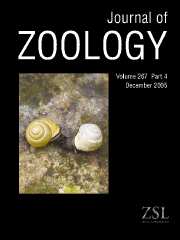Article contents
Functional morphology of the gizzard of the domestic goose: design of an artificial gizzard
Published online by Cambridge University Press: 01 September 1998
Abstract
An artificial gizzard was developed to investigate the functional basis of the asymmetry of the gizzard muscles of herbivorous birds, such as the domestic goose (Anser anser). Two types of gizzard muscle morphology were modelled: asymmetric muscles that generated a translational movement; and symmetric muscles that generated a compressional movement. The extent of breakdown of grass in the artificial gizzard was estimated by measuring nitrogen loss from blades of wheat (Triticum aestivum). The effect of grit and its interaction with the two types of gizzard muscle movement were also explored. In the artificial gizzard, translational movements caused more damage to grass than compressional movements and the damaging effect of grit was greatest when there was a translational movement. This type of movement was found to be particularly important as it prepares plant material for subsequent processing by stripping the matrix cells from the fibre bundles. Without such preparation, the breakdown of grass is limited.
- Type
- Research Article
- Information
- Copyright
- 1998 The Zoological Society of London
- 6
- Cited by




